By Michael McDowell
NYPD Commissioner James P. O’Neill found a full house on a recent visit to a Community Council meeting at the 20th Precinct on the Upper West Side, with those in attendance including New York State Assemblymember Linda Rosenthal, as well as representatives from the office of District Attorney Cy Vance, Council Member Helen Rosenthal, and Community Board 7.
O’Neill began with brief remarks.
“So far in 2019, overall crime is down about 1,600 crimes, which is a good number, and we’re at about 25,000 crimes overall.”
Some of this decline O’Neill attributes to policy change.
“We’ve changed many things that we’re doing at the NYPD. Specifically, the patrol model: we want to make sure that our police officers have the opportunity to make connections with people in the community, with neighborhood policing. As of May, we’ll have been implementing neighborhood policing for four years throughout the city, and it’s up and running in all 77 precincts, all of our housing PSAs [Police Service Areas], and about half of our transit districts. This was a sea change for us, but by and large it’s been embraced, and it’s really helping us push crime down all over the city,” O’Neill confirmed.
What most concerns the commissioner? Terrorism.
“I used to love holidays—Thanksgiving, New Years, Halloween, I used to love them all. Now I just want them to be over with,” he said, to laughter. Jokes aside, O’Neill has highly trained cops at the ready to respond immediately to any incident, as well as to serve as a “uniformed deterrent” in places like Times Square.
Responsible for 36,000 police officers and 19,000 civilian employees, O’Neill told the crowd he was prepared for a “good grilling.”
Upper West Siders obliged.
Does he feel elected officials are supportive of the police? Do they let him do his job?
“Uh oh,” he began, with a nod toward Assemblymember Rosenthal. “By in large, I think they understand what the mission is, and that’s to keep people safe. Sometimes we’ll agree on things, and sometimes we won’t.”
One area of disagreement?
“The legalization of marijuana. If it comes to pass—and it probably will—we have to make sure it’s done correctly. There’s no instantaneous test for people driving under the influence, and I’m concerned about those under the age of twenty-one.”
Whatever nefarious business may be afoot at the state level, far worse brews in Washington.
“New York State and New York City have among the strictest gun control laws in the nation, and I think it has served our communities well,” said a man in the audience. “But there’s been a lot of talk about laws in other states that could encroach upon and limit these laws,” he continued. One such bill is the Concealed Carry Reciprocity Act, which renders valid concealed-carry licenses across state lines. It passed the House in 2017, but has since stalled in committee.
“It’s pretty much a lowest common denominator bill; if there’s a state where licensing is lax and this bill passes, it means that if I have a carry permit in…I don’t want to pick any one particular state [Texas, Florida], I will be permitted to carry that gun in New York State and New York City. I don’t think it’s going to happen, Cy Vance and I pushed back very heavily. I was down in Washington a number of times, talking to members of Congress and Senators, I did a piece with Cy Vance on 60 Minutes about it. The gun laws have been so helpful to prosecutors, ensuring that if you carry an illegal weapon in New York City that there’s consequences for that, and I think that is truly one of the things that has helped drive violence down in the city.”
Assemblymember Rosenthal asked about domestic violence.
“Every precinct has a domestic violence team, and they go out and proactively do visits. It’s something that we take very seriously, and we are committed to it. But we kind of buck the trend in New York City. In many other cities, when there’s a domestic violence homicide, there’s a history of domestic violence; that’s not always the case in New York, so we have to figure out other ways to help us predict if there’s going to be violence somewhere.”
Chief Kathleen O’Reilly, Commanding Officer of Patrol Borough Manhattan North, which includes the 20th Precinct, chimed in.
“I can’t speak to the citywide numbers, but in Manhattan North domestic violence is down 6 percent year to date, and down 7 percent in the 20th precinct.”
O’Neill also answered a question about enforcement of traffic laws. Upper West Siders frequently complain about lax enforcement of laws against both drivers and cyclists.
“We do write summonses to bicyclists, but most of the summonses that we write are to vehicles, because they are 2,3,4-thousand pounds,” O’Neill said. “When I worked in Central Park I was out on my police bicycle every day as the precinct commander, and I [still] bicycle every day—I’m out there every morning riding. You do feel vulnerable and it’s important that we keep bicyclists safe and we keep bike lanes clear.”
Captain Alexandra Sarubbi-Barcia was able to shed some light on enforcement in the 20th.
“When it comes to bicycles, we’ve had an increase of 30 percent for summonses. We have received a number of complaints, and traffic safety officers have been looking out for this specifically,” she said. “We are aggressively addressing it, but at the same time it’s also education, we try to get the word out, to let bicyclists know that they need to ride safely and that they need to follow the laws.”
Deputy Inspector Malin jumped in.
“That’s 88 summonses to bicyclists out of about 3,000 summonses to cars. We try to keep that proportional. There’s 516 collisions involving cars, and only 12 involving bicycles. So our enforcement is proportional to the amount of collisions that we see.”
After nearly an hour, Commissioner O’Neill made his exit. But before the evening concluded, Assemblymember Rosenthal briefly addressed homelessness, empty storefronts, e-cigarettes, and sanitation.
“I know a lot of you have been upset about all of the garbage cans that are either missing or overflowing. We did a walk with the Department of Sanitation and identified sites where people were…slobs, but also places where people were throwing out their household garbage, which is not allowed. We got some garbage cans sited, and we have a watch list of certain blocks. Sanitation is going to come out and make sure that they stay clean,” she said, to murmurs of approval.
Prior to the town hall, Deputy Inspector Malin had presented a local Domino’s delivery person an award. A young man was commended for having ridden his bike in front of a fleeing robber, who was also unloading counterfeit bills at businesses up and down Broadway. Pursuing officers were able to tackle and apprehend the perpetrator, who was subsequently positively identified by the victim.
“I too worked for Domino’s when I was a sophomore in college,” Malin said.



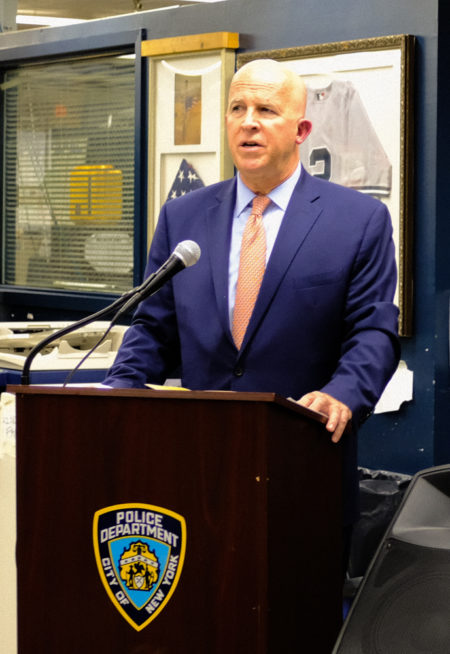
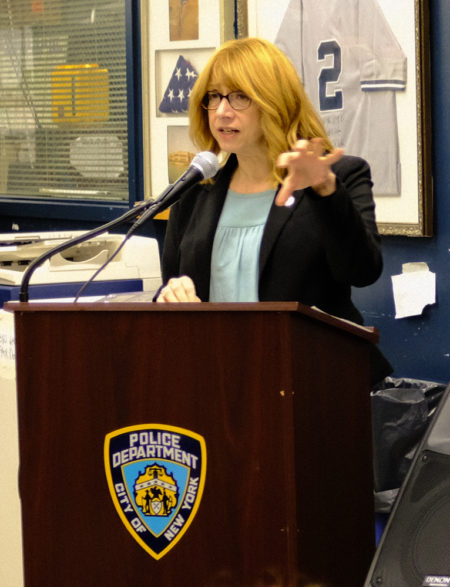
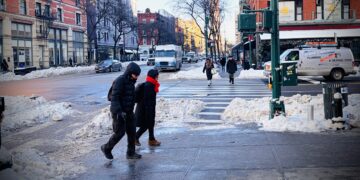


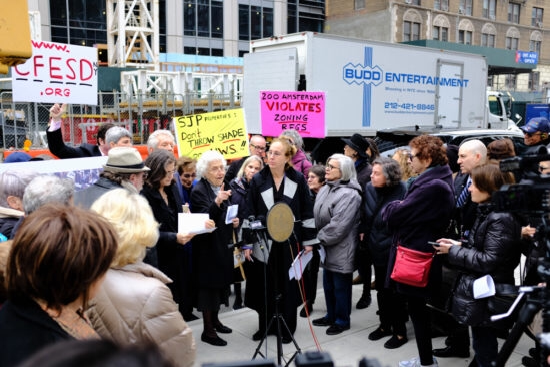

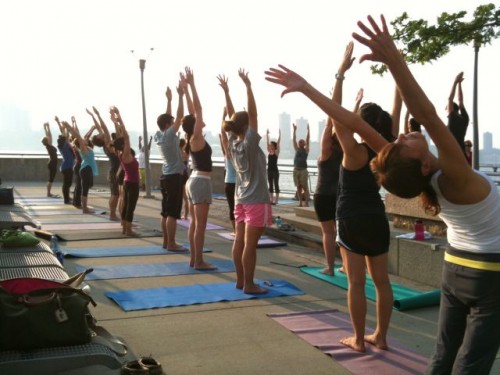
Anyone who believes that crime is down is clueless. The NYPD has downgraded quality of life crimes, like urinating un public and farebeating. The NYPD is changing its protocols from enforcing the law to having the “new police officers” judge situations, downplay them and NOT file reports to document incidents. It’s a statistical game that was started by Bloomberg and exacerbated by DeBlassio.
The NYPD has been politicized and is no longer an independent entity. It no longer protects and serve. It judges and rules on the scene whether a crime is worthy of reporting. This policy also is aligned with the dunce of a DA, Cyrus Vance. His ADAs throw out or reject many prosecutable arrests in keeping with a political agenda of low crime. These ar all reasons why good old, crime fighting cops are retiring by the hundreds on time without extra years. This is fact. So believe what you want, but it’s all nicely packaged fiction.
Agreed, and the whole point of this effort is to make DeBlasio appear “presidential.” The whole thing is sickening.
Just like they have done in the schools. No enforcement of the rules, no punishment and therefore the school has a better safety record. It’s all fiction.
Crime is down?
So why people on UWS are anxious walking outside in the dark being afraid that some mentally sick from all the shelters around will attack them?
Because you have a lot of fear in general?
I’m genuinely sorry that this is how you are feeling. We may not live in the same area of the UWS, but this is not my experience.
Here are the published stats for the same set of major crime categories over many time scales: https://www1.nyc.gov/assets/nypd/downloads/pdf/crime_statistics/cs-en-us-020pct.pdf
At every time scale, these major crimes are still trending down. I don’t like to smell pee in the street or see people cheating on their fares either, but if that re-focusing of resources leads to drops in major crime, it’s a good call in my opinion.
I’d like to understand the root causes of this sustained drop. I’m sure it’s been studied.